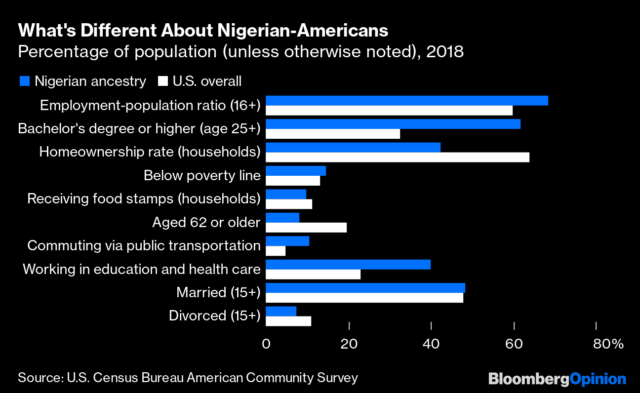 With the recent international ban by the president of the United States on Nigerian immigrants and five other countries, there’s been a growing speculation amongst world economist that Nigerian-Americans actually play a pivotal role in the success of the American economy therefore there is be a need for Nigerian immigrants in the U.S.
With the recent international ban by the president of the United States on Nigerian immigrants and five other countries, there’s been a growing speculation amongst world economist that Nigerian-Americans actually play a pivotal role in the success of the American economy therefore there is be a need for Nigerian immigrants in the U.S.
This report will not be centered on the verdict on whether the White House decision to suspend immigration from Nigeria — the world’s seventh most-populous nation — and five other countries was mainly an expression of bigotry from an administration led by a man who once likened African nations to latrines, or if it was a legitimate reaction to security concerns. It will, however, tell you some things you might not know about Nigerian immigrants in the U.S.
There is a good number of immigrants from Nigeria and that is why this statistical analysis is focusing on Nigeria and not Eritrea, Kyrgyzstan, Myanmar, Sudan or Tanzania, the other five countries hit by the new ban). An estimated 374,311 Nigerian-born people were living in the U.S. in 2018, which put the country in 27th place as a source of foreign-born Americans, behind Pakistan and ahead of Japan. These and a lot of the numbers to follow are based on the American Community Survey that the U.S. Census Bureau sends out to 3.5 million households every year, so they’re subject to margins of error (19,648 for the number cited above), plus the inevitable strengths and limitations of self-reported statistics.
The Census Bureau says there were an estimated 462,708 people of Nigerian ancestry in the U.S. in the 2018, but that’s based on what people put on the survey, not the sort of genealogical investigation that would surely reveal that there are millions of Americans whose forebears were brought across the Atlantic against their will in past centuries from the region of West Africa that is now Nigeria. Still, for our purposes the census survey is probably better, in that it restricts the scope mostly to recent immigrants and their kids. The members of this group have more than doubled in number since 2007, and they are for the most part doing quite well.
The media income for households led by someone of Nigerian ancestry, for example, was $68,658 in 2018, compared with $61,937 for U.S. households overall. Here are a few other informative comparisons:
Nigerian-Americans are more likely to have jobs than other immigrants, and much more likely to have college degrees. They’re also much less likely to own their homes, and slightly more likely to be below the poverty line — although they’re less likely to collect the Supplemental Nutrition Assistance Program benefits commonly known as food stamps. Nigerian-Americans are younger (median age is 31.6, compared with 38.2 for the U.S. overall), more likely to live in big cities (at least, that’s how I interpret the relatively high share of public transportation users), more likely to work in education and health care (there are a lot of Nigerian-American doctors) and slightly more likely to be married.
The percentage of Nigerian immigrants 16 and older with jobs ranked them 10th among immigrant groups in the U.S. in 2017 (the Census Bureau’s new data portal is still updating informations and that has hindered a compilation of rankings for 2018).
Nigerian immigrants also came in 10th place for the percentage with college degrees.
Australia, Bulgaria and Nigeria are the only countries to make it into the top 10 on both rankings, which indicates a sort of integration sweet spot. Nigerians who come to the U.S. usually speak English before they get here, they tend to be well educated or in the process of becoming so, and they don’t seem to have much trouble getting jobs or otherwise fitting in. These qualities should not be the only things immigrant success should be judged by, there should be something more than a little creepy about passing such judgements upon people by their country of origin.
However, with immigration policy in general and the new bans in particular, it does seem relevant to note the qualities the Nigerian-Americans bring to the economy of the united states in terms of their Human numerical and intellectual resources as statistical analysis have also shown that they are clearly among the most successful immigrant groups in the U.S.







